- Please tell us about GIZ.
 The Deutsche Gesellschaft für Internationale Zusammenarbeit (GIZ) GmbH is a global service provider in the field of international cooperation for sustainable development and international education work, with 24,977 employees. GIZ has over 50 years of experience in a wide variety of areas, including economic development and employment, energy and the environment, and peace and security. Our business volume is around 3.7 billion euros. As a public-benefit federal enterprise, GIZ supports the German Government and in particular, the Federal Ministry for Economic Cooperation and Development (BMZ) and many public and private sector clients in around 120 countries in achieving their objectives in international cooperation. With this aim, GIZ works together with its partners to develop effective solutions that offer people better prospects and sustainably improve their living conditions.
The Deutsche Gesellschaft für Internationale Zusammenarbeit (GIZ) GmbH is a global service provider in the field of international cooperation for sustainable development and international education work, with 24,977 employees. GIZ has over 50 years of experience in a wide variety of areas, including economic development and employment, energy and the environment, and peace and security. Our business volume is around 3.7 billion euros. As a public-benefit federal enterprise, GIZ supports the German Government and in particular, the Federal Ministry for Economic Cooperation and Development (BMZ) and many public and private sector clients in around 120 countries in achieving their objectives in international cooperation. With this aim, GIZ works together with its partners to develop effective solutions that offer people better prospects and sustainably improve their living conditions.
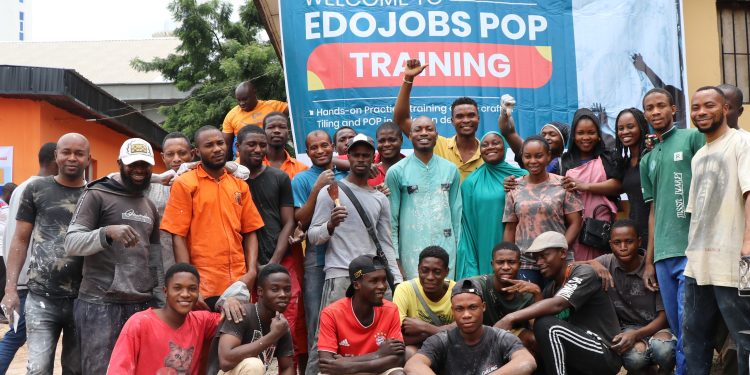
- What exactly does GIZ do in Nigeria?
GIZ’s work in Nigeria focuses on four main areas of work: (1) Sustainable economic development and promotion of jobs, (2) transformation of agri-food systems, (3) climate and energy, (4) health, social protection and population policy, and (5) peace building and good governance. Thus, those topics describe well the main working areas of GIZ in Nigeria, with gender equality being a major cross– cutting topic, which we are trying to address in all of our projects and activities. It is important to emphasize that as a service provider with worldwide operations in the fields of international cooperation for sustainable development and international education work, GIZ works with its partners, in this case the Nigerian counterparts, to develop effective solutions that offer people better prospects and sustainably improve their living conditions.
The project I am working in, which is called Skills Development for Youth Employment or simply SKYE, specifically focuses on improving the
employability of young Nigerians, by providing them with training to increase their labour market relevant skills. We hope that this will eventually enable young Nigerians to find regular employment with a stable income and more possibilities to pursue a professional career, based on the principle of life-long learning. To achieve this, we cooperate with state actors on the federal and state levels involved in the system of technical vocational education and training (T-VET) as well as agricultural vocational education and training (A-VET). This cooperation also involves the private sector and representatives of the civil society.
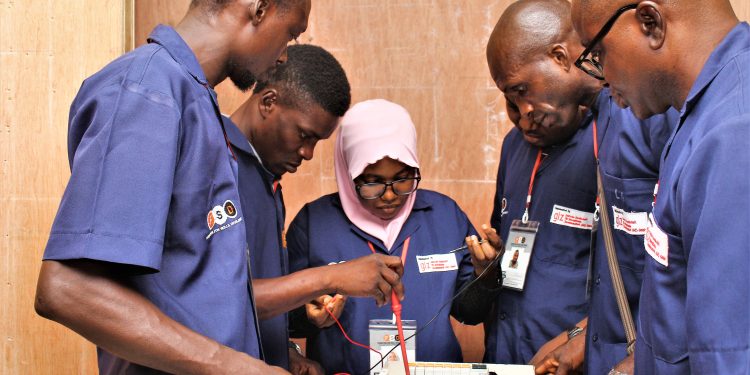
- Does GIZ operate in any other African country?
Yes, GIZ directly works in around 40 of the 54 African countries and also has ongoing cooperation with various inter- and supranational organizations like for instance ECOWAS, the Southern African Development Community (SADC) and the African Union (AU).
- When was GIZ established in Nigeria? Do you operate across all the regions of Nigeria?
Our longstanding partnership with Nigeria dates back to 1974, almost 50 years already. GIZ is present in more than 32 States with different projects we are currently implementing. The GIZ-SKYE project for instance conducts the bulk of its activities in Abuja and in states such as
Adamawa, Edo, Enugu, Lagos, Ogun and Plateau. Due to the methodological approach of our work and our focus on the construction and agricultural sectors, we need some presence of the private businesses in the areas of our intervention. But other projects of GIZ cover different states of Nigeria as well, depending on the scope of their thematic orientation.
- What has been the socio-economic impact of GIZ in Nigeria, if any?
Speaking specifically about the GIZ-SKYE project, where my expertise is, we have supported on a first glance during the last years the skills development of more than 26,000 young Nigerians, out of which almost 5000 have found a job afterwards that can be traced back directly to our activities. Thousands of small-scale farmers participating in our activities, like the so-called farmer business schools for instance, were able to increase their income and over 326,000 Nigerians have received information and consultation services, enabling them to choose careers that suit their talents and interests and give them better chances to find employment. Now, in terms of political dialogue and regulations, we were able to update nine National Occupational Standards for professions like masonry, plumbing, office administration and agricultural machine maintenance, just to name a few. Not only have some of those standards been updated to today’s labour market requirements for the first time but more importantly, our approach brings together representatives from the organised private sector and representatives from the public educational system, on all hierarchy levels. We hope to further foster this process and thus, to create in the long term a model for a structured new process of how to develop in the future, professional standards as a joint task of the public and the private sector. This shall modernise the Nigerian system of professional education and increase the competitiveness of the Nigerian labor force and Nigerian companies.
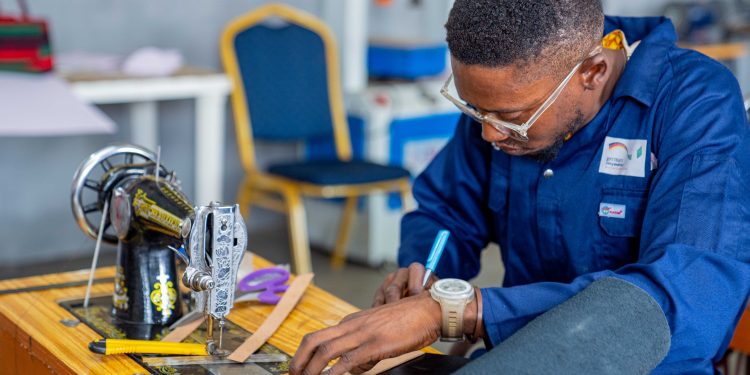
- What has been GIZ’s biggest challenge in Nigeria?
In terms of implementation, the current security situation in some parts of the country.
- How long have you been here? What do you think of Nigeria?
I am personally still very fresh off the plane. I joined my team in Lagos at the end of September 2022 but luckily, I have very experienced colleagues, both locals and foreign nationals. Many of the latter have been living here for several years, which is certainly a good indicator that they enjoy their work and life here. Still, I will say that I have been pleasantly surprised by the kindness and friendliness of the Nigerians I have met so far. Lagos especially seems to never sleep and the people here are unbelievably active and busy. But traffic in Lagos is a challenge to put it mildly.
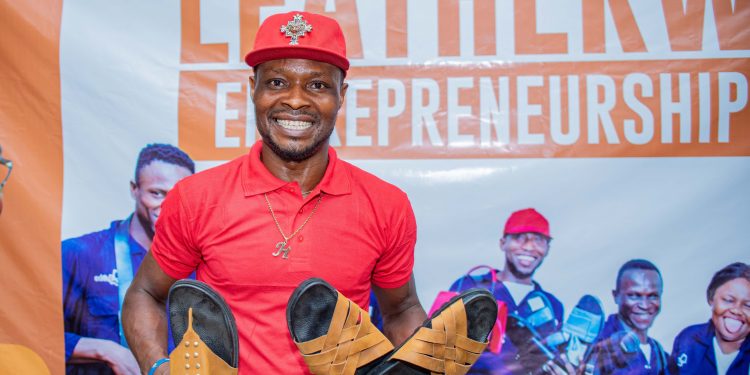
- Speaking from your working experience, how do you assess the technical ability of Nigerians?
First off, my experience in the country time wise, is still rather limited. However, when it comes to assessing the specific technical knowledge of Nigerians, I must admit that often there seems to be some room for improvement. The contents of many professions as they are taught here are sometimes outdated and the available equipment to fulfill a task is often too old. Simply updating the contents is usually not enough. The modernisation of such outdated standards usually needs to be redeveloped from scratch, since the technical development is happening ever faster. The professionalism is more difficult for me to assess because here cultural differences might play a role. But when looking for instance at the vivid art scene here in Nigeria, be it music, handcrafts or paintings, it is hard to imagine a more professional level than the one already existing. I think that Nigerians are very creative and have the professional and technical ability to make the most possible out of sometimes very limited means. And I have witnessed how hard Nigerians work, so I believe if we can somehow manage to direct this Nigerian energy into modernising the country’s
system of professional education, Nigeria will be a fierce challenger in the global competition.
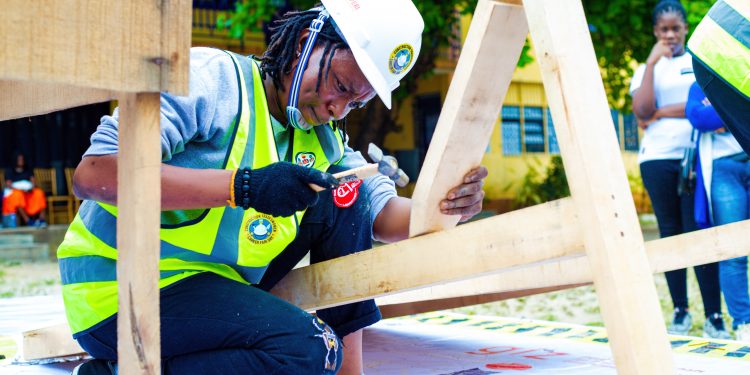
- Tell us a little about the German Dual Education system? How does it actually work and what are its advantages?
Generally speaking, the state plays a rather limited role in the German system of dual professional education. The key driver is the organized private sector. In the late 1960´s the German federal government introduced a law on vocational education and training, specifying the roles and responsibilities of the different actors involved from the public and the private sector, as well as the civil society. The private sector in Germany is organized regionally in chambers of commerce and Industry, chambers of crafts as well as agricultural chambers, to name the most prominent organizations. Together with employee representatives like unions, it is the private sector setting the professional standards, largely independently and without much interference from the government. We believe that private companies do know best what knowledge, skills and ultimately the competencies the employees must possess to get their job done. The role of the government and the relevant ministries and other state bodies is usually limited to setting the overall legal framework and to foster the complex coordination processes of planning, developing and updating professional standards. Furthermore, the state is largely financing the running costs of TVET schools and the teaching staff plus of course the necessary equipment for practical trainings within the schools. But regarding the latter, the private sector again very often is voluntarily providing schools with consumables and especially some quite cost intensive equipment, usually the same machines that are used by the companies. The focus of the Dual system is a high amount of practical experience. This learning within the working process is accompanied by so-called in-house trainers, which comprises staff members who have received special pedagogical and didactic training, enabling them to guide and accompany the apprentices while they are learning and working within the company. This strong practical focus is then complimented by theoretical teaching in schools. This means the majority of the time of the apprenticeship is taking place in the company, while the apprentice is receiving a high-quality theoretical education as well in school. And it is this combination of practical training and theoretical knowledge that gives the dual system of professional education its very name.
- In what way would you say that it has helped to develop Germany into the engineering and technical powerhouse that the whole world recognizes it to be?
Historically, elements of the German dual education system date back as far as the late medieval times, more than 500 years ago. It was then during the mid-nineteenth century that a strong culture of education developed within the German population and being educated became for the citizens a value for itself, independently from income creation or following a specific career path. Germany had a reputation within Europe for being poor but educated and many people within the traditional professions, like handcrafts for instance, took a lot of their identity and pride out of their profession, which is as well the case today.
I would argue that this trend to gain education, together with the industrialisation laid the foundation for the engineering and technical skills Germany is famous for today. And I would say that even as far back as then, there already existed a system of practical learning within the working process, even though the dual system as we know it today was not constituted until 1969. The subsequent rapid developments in technology and industrialisation provided a very positive foundation to support Germany’s transition into becoming a modern industrialised country. But I am not a historian, so I am sure there are more knowledgeable scholars out there who may have a slightly different take on that.
- I have always said that one of the problems that beset Nigerian society, is our penchant to put how things make us look above real value. A significant number of our university students should not be in university but are there because of their parent’s egos. Their abilities and skills are far better suited to a technical education rather than an academic one. In the end, they may live less than meaningful and fulfilling lives. If we can get Nigerians to change their mindset, it would be infinitely more beneficial to both the individual and the society. Did Germany face a similar mindset challenge in the past? If yes, how did they overcome it?
I could not agree more and unfortunately since the early 2000s we have witnessed a similar trend in Germany. For many years the comparatively low numbers of young Germans choosing to obtain a university degree was continuously criticized, in my opinion often not realizing how much high-quality theoretical knowledge the apprentices in the German dual system need to acquire, especially in technical professions. As a result, Germany is also currently experiencing challenges in attracting enough young people to take up a career in the dual educational system. In Germany,, just as in Nigeria, the parents play a key role in shaping the future careers of their children, even though many young people in Germany would be much better suited for an apprenticeship, in regard to their talents and interests, instead of striving for a university degree.
Several German governments and the involved stakeholders from the private sector and the civil society started to tackle this problem in the last few years by making the system of higher education for instance more flexible and integrating a new system of higher professional education. This process was accompanied by the development of a National Qualification Framework for Life-Long Learning (NSQF), which comprises a total 8 levels of training and education. A Bachelor’s Degree for example is within the German NSQF on level six, while someone finishing an apprenticeship is on level four. However, after gaining some years of work experience plus obtaining some additional job-related education like the Meister, that person is now formally on the same qualification level as a university bachelor’s degree holder. This allows well experienced and trained professionals to access university programs in Germany and other European Union countries. Of course, the issue is manifold, and this is just one measure to make the dual educational system in Germany more attractive again. But I think there is reason to believe that we might see again, a strong trend in Germany of young people following a career path starting with a classical apprenticeship.
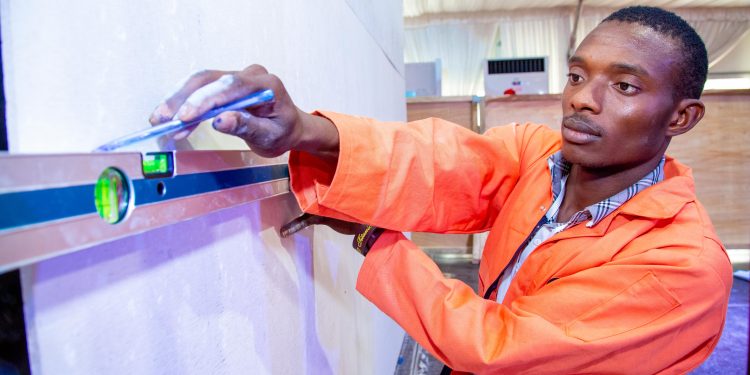
- Is there any African country that has adopted the dual education system or is currently debating the possibility of doing so?
I must admit that I am not up to date with the developments and plans in other African countries, since for the last decade my own regional focus of work was more centered around the Middle East and Central Asia. However, I know that Ethiopia, Kenya, South Africa, and Togo have been trying for some years to adopt at least some of the main characteristics of the dual educational system.
- I read somewhere that apprentices who take the dual education route in Germany are paid a salary by their “employer” though less than their regular employees are paid. Is that true? If true, adopting this scheme here in Nigeria would certainly reduce the financial burden of parents while their child is undergoing schooling. Would it not?
Yes, this is correct. Apprentices do receive a salary from their employers. They actually have a legally binding working contract with them, determining the duties and rights of both sides. Thus, apprentices are subject to the German labour law, just like regular employees. The salary amounts of the apprentices are very roughly speaking somewhere between 30 % to 40 % of a “regular” starting salary in the respective profession, for staff having just finished an apprenticeship but do not yet possess that much working experience. Salaries are automatically increased annually during the apprenticeship, following the logic that with every additional year of gaining knowledge, skills and experience the apprentice can fulfill more tasks independently and thus, contribute to the employers’ economic success. On average, adolescents in the German system of dual professional education are around 17 to 18 years old when starting their apprenticeship, which usually takes 3 years. Depending on prior experience, as well as learning results during the apprenticeship, it is possible to shorten the total time to two and a half years in some professions. However, other professions, usually the more technology oriented ones, even have a regular term of three and a half years. Older apprentices, not living with their parents anymore when starting their career in the dual educational system, have some opportunities to receive additional financial support from the state, since usually for an adult the apprenticeship salary is not sufficient to hire an apartment and bear the daily costs of living.
- Do a lot of the organisations involved end up employing the students/apprentices who “worked” there? After all, the organization would have trained them according to their standard already. And of course, training is not cheap.
On average three-quarters of the apprentices continue to work for the same company where they did the apprenticeship. There is actually an interesting trend, because this number increased from roughly 60% to almost 70% over the last two decades, according to surveys conducted by the German Federal Institute for Vocational Education and Training (BIBB). This trend emphasizes on the one hand that training is costly indeed, even though, not to train actually becomes more expensive in the long run. On the other hand, this trend shows that German companies are facing challenges nowadays finding competent labour force, thus they are more often interested in keeping their well-trained apprentices, already familiar with their specific technologies and working processes. But the aforementioned 70% are average figures. Some companies will offer basically all of their apprentices a regular working contract after the apprenticeship. Other companies have limitations in this regard but want to train apprentices anyway, since they understand it as a part of their corporate culture and social responsibility. To train adolescents and to offer them a qualified start into their professional lives is almost part of their DNA.
- If Nigeria was to one day decide to adopt the German style dual education system, do you think it would benefit significantly from it? Would you recommend it?
There is not one dual system in professional education. There are many ways of increasing the involvement of the private sector and other relevant stakeholders of the civil society and to increase the practical aspects of the professional education system. I believe that Nigeria must and can find its own way of adapting a Nigerian dual educational system which suits its own traditions and cultures. To some extent, this even exists already, for instance in the informal sector when we talk about the so-called road-apprenticeship system. If Nigeria could manage to improve the quality standards within this road apprenticeship system while reforming and modernising its current official system by making it more labour market relevant and practice oriented, then yes, I am convinced the country, and the Nigerian people would benefit a lot from it. I hope at that time, we at GIZ will have the opportunity to play a small role in supporting this process.
__________________________
Christian Stehling, was born 9th of June 1980 in Frankfurt/Main Germany. He began his professional life after middle-school with an apprenticeship as a chef in the German dual system of professional education. After obtaining his A-Level exams at a night school he studied political science and obtained a bachelor degree with a specialization on EU politics at the University of Osnabrueck/Germany and a master degree at Maastricht University in the Netherlands. He worked as a scientific assistant for several members of the federal parliament of the German “Bundestag”. Since 2014, he has been working for GIZ as an advisor in several projects in the sector of professional education and labour market, for instance in a number of Central Asian countries like Kazakhstan, Kyrgyzstan, Tajikistan and Uzbekistan as well as Turkey, before joining the GIZ- SKYE project in Nigeria in 2022.






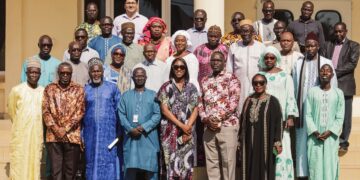























































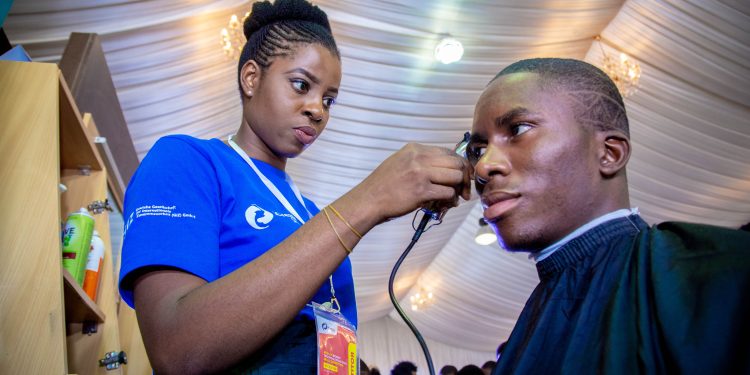




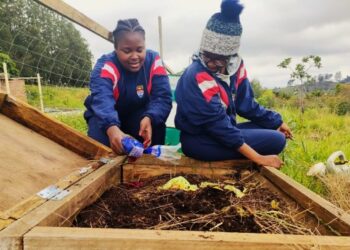


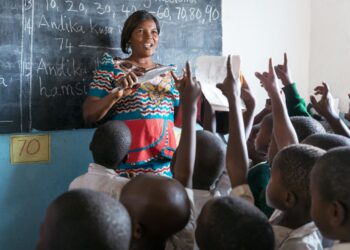

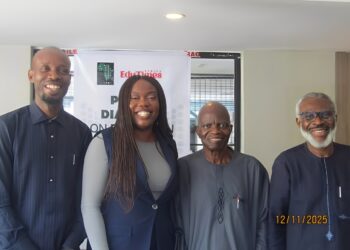










 EduTimes Africa, a product of Education Times Africa, is a magazine publication that aims to lend its support to close the yawning gap in Africa's educational development.
EduTimes Africa, a product of Education Times Africa, is a magazine publication that aims to lend its support to close the yawning gap in Africa's educational development.